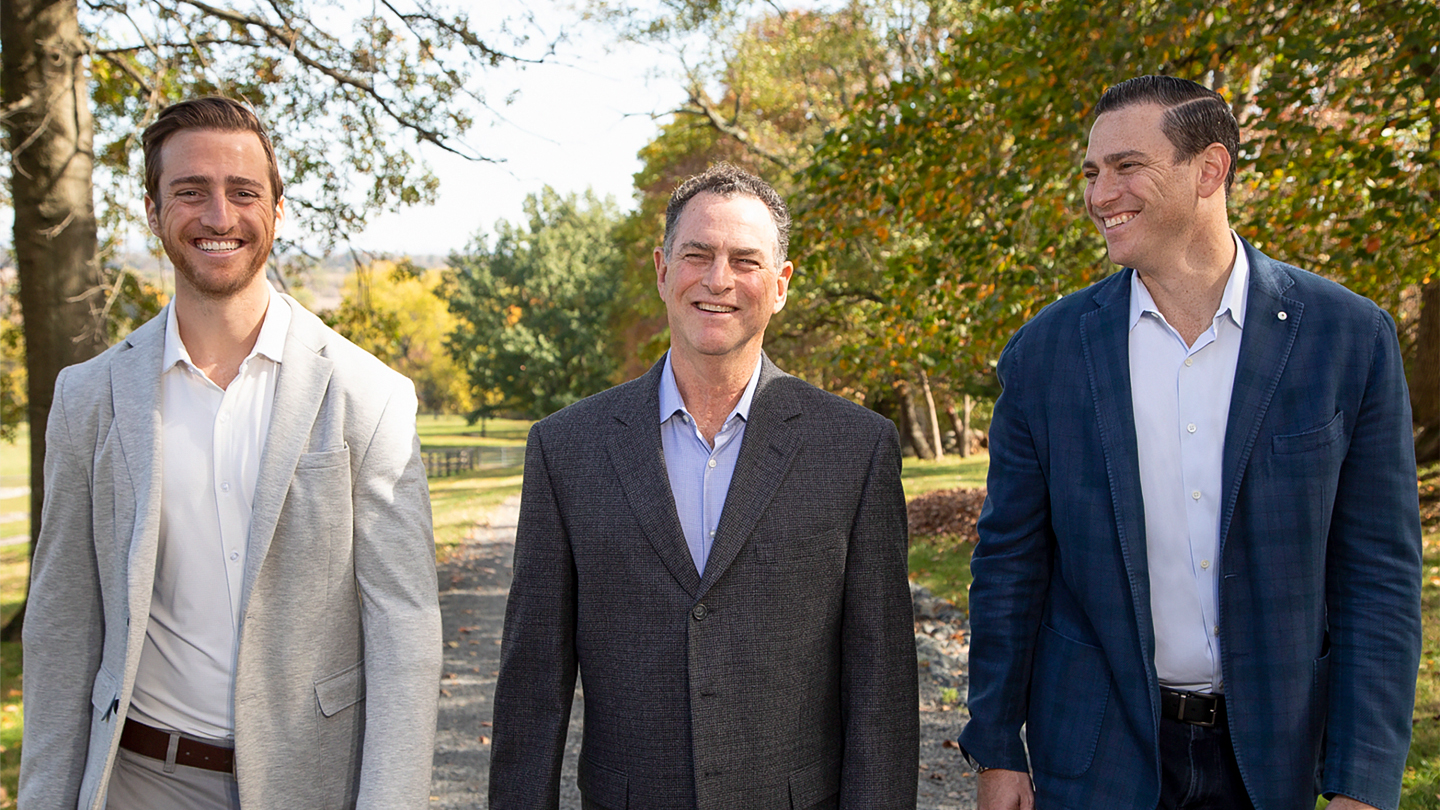Matt Kamine ’07 and Justin Kamine ’11

Co-founders and CEOs
Do Good Foods
After five years of planning, entrepreneurial brothers Justin Kamine and Matt Kamine are one step closer to achieving their goal of significantly reducing food waste in the United States, starting with something as simple as feeding chickens.
Their innovative solution is Do Good Foods, which they launched late last year. Do Good Foods has pioneered a closed-loop system that collects unsold fruits, vegetables, and proteins from supermarkets and converts the food into a nutrient-dense, healthy dry feed for chickens.
“This feed, when used to raise our chickens, will launch one of the first-ever carbon-reduced retail protein systems and bring sustainability to scale in the animal protein space while solving one of the food system’s biggest problems, food waste,” Justin says.
The Kamines’ thesis was built around the fact that 40% of all food grown in the United States is thrown away and the shocking statistic that if food waste were a country, it would be the third largest greenhouse gas emitter. To address concerns about the inefficiency of the food system, the Kamines want to maximize the use of surplus food
by converting what can’t be donated into animal feed.
This feed, when used to raise our chickens, will launch one of the first-ever carbon-reduced retail protein systems and bring sustainability to scale in the animal protein space while solving one of the food system’s biggest problems, food waste.
Justin Kamine ’07
Co-CEO of Do Good Foods
“This notion of feeding our animals our leftovers has been around for centuries. Now, we are simply bringing a large-scale solution to work with the biggest companies in the world and address what in our minds is one of the biggest inefficiencies within our agriculture markets—the food we waste,” Justin says. “Creating this closed-loop agriculture system is critical for humanity and putting our plate and our planet in line together.”
While complex in scope, their approach is quite simple: collect healthy food at the end of its shelf life from a network of supermarkets. “It is important to note that we collect this food after any donations can occur,” Justin says. “This food is kept in the cold chain, and we are able to upcycle it into a pathogen-free, nutrient-consistent animal feed.”
How do they do this?
Do Good Foods supplies large Yeti-style coolers to a network of 450 supermarkets, where the bins are kept inside the markets. Store employees remove packaging, and Do Good Foods then collects about 160 tons of food daily and delivers it to a new 85,000-square-foot processing facility in Fairless Hills, Pa., about 25 miles north of Philadelphia, where it’s converted into chicken feed.
The brothers’ plan to build similar facilities across the country is already backed by a $170 million commitment by Nuveen, a global financial planning firm. More grocers value their partnerships with Do Good Foods because it spares them the cost of hauling away unused food, which can cost up to $100 a ton, Justin notes.
“Our logistics network picks up this food daily, and once at our facility, we are able to process the mix we get into a nutrient-consistent, pathogen-free dried animal feed that can then go directly into existing feed mill infrastructure the very next day,” Matt says. “This is a massive solution to driving toward a closed-loop, waste-free agriculture system.
“This closed-loop system is healthy for the animals, great for the environment, and fits into existing business infrastructure, making it economically viable for the supermarkets that throw away the food, for the farmers that raise our food, and for us as consumers,” he adds.
So how do consumers play a role?
“Our sustainability story comes full circle because chickens fed with this feed product are then packaged for retail sale under the brand Do Good Chicken,” Justin says.
Because of the unique way these birds are fed, Do Good Chicken is one of the first verified domestic chicken brands actively combating climate change. Each Do Good Chicken keeps about 4 pounds of surplus grocery food out of landfills, reducing nearly 3 pounds of greenhouse gases. “Empowering us as consumers to simply buy a piece of chicken, if it tastes the same and is priced the same . . . why not Do Good for our plate and our planet?” Justin says.
Competitively priced Do Good Chicken will be available at major grocery stores beginning in April 2022. The cage-free chickens are raised and harvested in the U.S. with no antibiotics, reassuring consumers of product quality in addition to the climate-forward mission of the brand.
The mission of Do Good Foods is to solve big environmental problems, while empowering consumers to be a part of the solution.
“We need urgent action—now— on climate change, and our product helps consumers be a part of the solution to help end food waste and improve the environment, simply by choosing a new brand of chicken,” Matt says.
“What’s really exciting is that if just 1 out of every 5 pounds of chicken consumed in the U.S. was a Do Good Chicken, we could solve supermarket food waste in the next five years,” he notes.
Do Good Foods is the latest creation of the socially conscious Kamine Development Corp., led by founder and chairman Harold Kamine ’78, Justin’s and Matt’s father.
The successful, innovative family-run company builds, finances, and operates large-scale infrastructure.
The collective vision of the Kamine family and Do Good Foods is that massive scale infrastructure can help change the world for the better, allowing people to make a difference in comparably small spaces.
“Now you can fight food waste and combat climate change in your kitchen with a piece of chicken,” Justin says. “Who could have imagined that chicken could help save the world?”